Annual Report 2015
Annual Report 2015 for the Chartered Trading Standards Institute (CTSI)
1. Contents
- Introduction
- Overviewing membership and the wider sector
- Governing the Code
- Promoting the Code
- Monitoring compliance with the Code
- Enforcing compliance with the Code
- Invoking non-compliance action
- Convening the indpendent Non-Compliance Panel
- Convening the independent Appeals Panel
- Resolving consumer complaints in respect of members
- Resourcing the RECC team
- Looking ahead
2. Introduction
This Annual Report has been produced for the Chartered Trading Standards Institute (CTSI). It sets out the Renewable Energy Consumer Code's principal achievements during the calendar year 2015. RECC is approved by CTSI under the Consumer Codes Approval Scheme (CCAS). The Code was first approved by Office of Fair Trading (who ran CCAS up to 2013) in 2007 (Stage One) and in 2011 (Stage Two). 2015 was the tenth full year of the Renewable Energy Consumer Code.
3. Overviewing membership and the wider sector
Renewable Energy Consumer Code (RECC) is designed specifically for businesses that sell, lease and/or install small-scale renewable energy generators. We bring over ten years of experience in renewable energy as the basis for promoting high standards of protection for consumers, thereby promoting simultaneously the reputation of our members and the wider sector in which they operate.
RECC takes its role very seriously and we do all we can to provide our members with in-depth training and guidance to help them raise their game. From 2006 to 2015 RECC was the only CTSI-approved consumer code in the sector. In August 2015 CTSI approved a second (Home Insulation and Energy Systems Contractors Scheme) consumer code, and gave preliminary approval to a third (Glass and Glazing Federation).
A small-scale renewable energy generator can represent a very significant investment for consumers when compared with other purchase decisions they make. Consumers need accurate information in advance of signing a contract, in a format that they can readily understand and compare with other offers they receive.
Any business that agrees a contract with a consumer in the sector must be certified by the Microgeneration Certification Scheme (MCS) if the consumer is to benefit from Government financial incentives such as the Feed-In Tariff (FiT) and Renewable Heat Incentive (RHI). Any businesses seeking MCS certification must first be a member of a CTSI-approved consumer code.
3.1 Overviewing RECC membership
RECC’s membership grew steadily from just 30 members in 2006 to 5.500 in 2012. The next two years saw a decline in number of members following reduced FiT rates. The majority of RECC members continued to sell and install solar PV systems, most paid for by means of consumer finance. However, 2014 saw the introduction of the domestic RHI with more heating and plumbing businesses among RECC members as a result. 2015 was the first full year of the domestic RHI.
The number of disputes registered with RECC rose in 2015 with 1,452 disputes registered, up 22 % from 1,186 in 2014. In 2015 once again the majority of disputes were about solar PV installations. The percentage of all domestic solar PV installations which resulted in a dispute registered by RECC in 2015 has remained constant in 2015 at 0.7%. (See page 34 for more details.)
Fig 3.1 RECC Membership by year
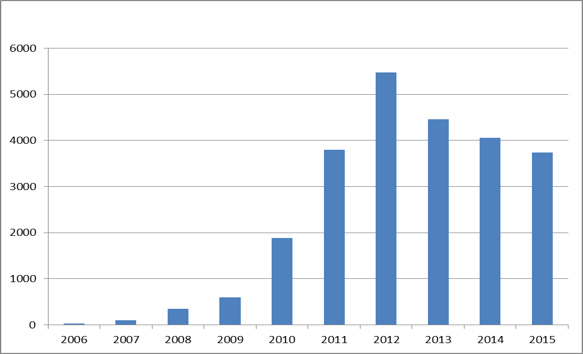
Fig 3.2 RECC membership in 2015 by number of employees
(Membership categories correspond to the total number of employees involved in renewable energy activities, including backroom staff and sales representatives, even when these are not directly employed by the company. The membership category is verified during audit.)
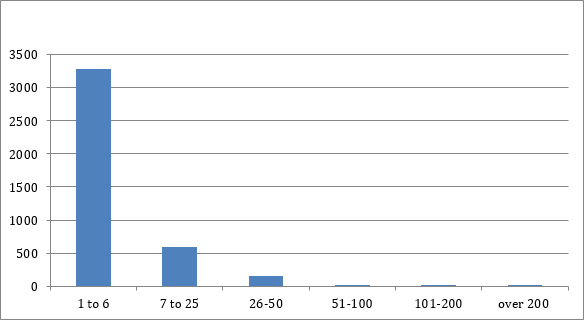
3.2 The wider sector
The figures in this section provide a breakdown of solar PV installations registered each month since the Feed-in Tariff was introducted in April 2010 (source: 3.3, 3.4 and 3.5: Ofgem; 3.6: DECC).
Fig 3.3 Number of installations registered for FiT from April 2010
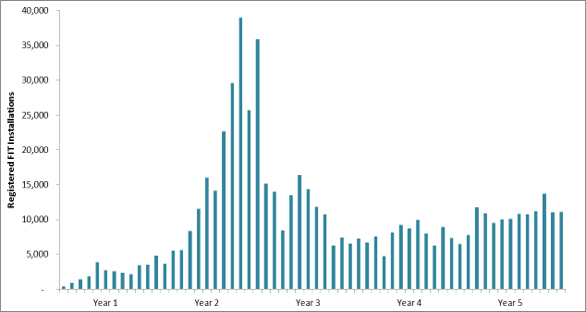
Fig 3.4 Total installed capacity by installation type for each year of the FiT
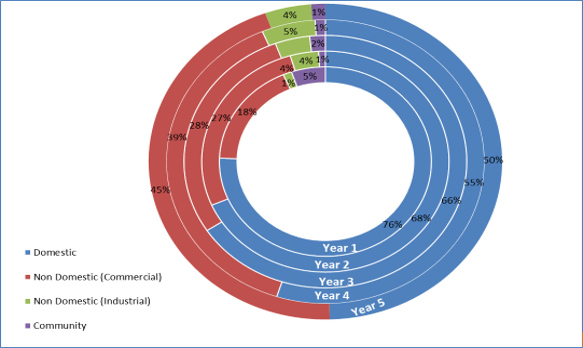
Fig 3.5 Total installed capacity and registered installations by installation type
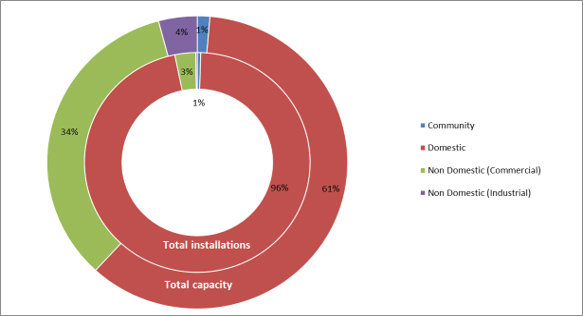
Fig 3.6 UK solar PV deployment by capacity band and year
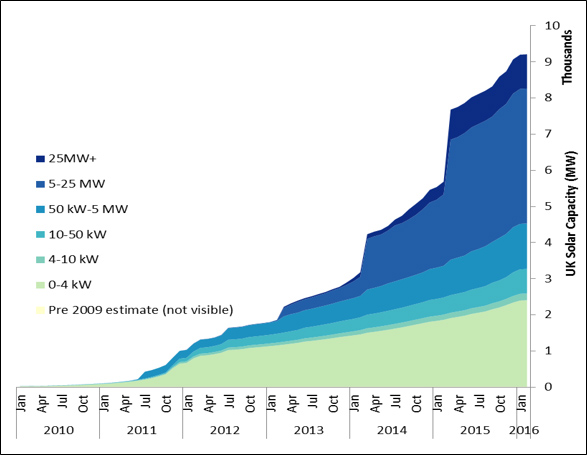
4. Governing the Code
RECC is administered by Renewable Energy Assurance Ltd (REAL) with a Board of Directors, both Executive and Non-Executive. REAL is a wholly-owned subsidiary of Renewable Energy Association (REA), the leading trade association in the renewables sector. REAL operates on a not-for-profit basis. We use all the membership fees we receive to: improve continuously the services we provide for our members; encourage and monitor our members’ compliance with the Code and Bye-Laws, and resolve consumer disputes in respect of our members.
4.1 Updating the Code
The Code sets out the relationship between RECC members and consumers. The Supervisory Panel oversees the Code which is a living document and has to reflect developments in the policy, legal and industry context within which it operates. CTSI also requires us to ensure that the Code is updated to take account of any legislative and regulatory changes and to reflect the lessons drawn from our monitoring activities, any feedback we receive and the disputes registered. In addition we take account of guidance and specific suggestions we receive from CTSI, the Supervisory Panel, the REAL Board of Directors and a range of consumer-facing organisations.
The Code has been adapted and revised annually since it was first drafted in early 2006. It was not amended in 2015, but will be in 2016 to take account of changes in consumer protection legislation and developments in the sector.
4.2 Updating the Bye-Laws
The RECC Bye-Laws govern the relationship between RECC and its members. The REAL Board of Directors is responsible for adopting and overseeing the Bye-Laws which are reviewed from time to time in parallel with the Code. The Bye-Laws were updated in July and October 2015. The principal amendments were intended to:
- permit RECC to share information with other CTSI-approved Consumer Codes;
- introduce more detailed provisions for the transfer of membership to a different entity and for changing a member’s name;
- update provisions for granting temporary membership;
- adjust obligations on members to pay costs ordered by NCP in the event of an appeal; and
- implement an administration charge for multiple disputes registered against one member.
4.3 Overseeing the Code
The Supervisory Panel oversees and advises on the running of the Code. Its governance arrangements are set out in full in the RECC Bye-Laws. Its members are independent of the RECC Executive and a majority of them, including the Chair, are also independent of the sector. The Panel’s responsibilities include:
- reviewing and updating the documentation relating to the Code and the scheme;
- overseeing the implementation of the Monitoring Strategy;
- reviewing RECC Members’ complaince with the Code based on the results of monitoring activities;
- establishing such Expert Groups as it may consider necessary to advise it; and
- reviewing any reports presented to it by the Executive.
In 2015 the Panel met four times, on: 18 March, 10 June, 9 September and 2 December. David Laird has been the Chairman of the Panel since August 2012. He replaced Dr Gill Owen who had been the Chair of the Panel from June 2006 to July 2012. The Minutes of the Supervisory Panel Meetings are available on the website here: www.recc.org.uk/scheme/supervisory-panel/meetings-notes . In 2015 the Supervisory Panel members were as follows:
Supervisory Panel Members
| David Laird | Chairman |
| Bryn Aldridge | former City of London Trading Standards |
| Walter Carlton | Deloitte |
| Louisa Coursey | Renewables UK |
| David Frise | B&ES |
| Gretel Jones | independent consumer expert |
| Heather Kerr | MCS Administrator |
| Zoe Leader (now Gujerro) | Citizens Advice |
| Mike Landy | REA (now Solar Trade Association) |
| Steve Lisseter | Independent consumer and competition issues expert, formerly Director of Consumer Codes at the OFT |
| Gideon Richards | MCS Chair |
| Neil Schofield | Worcester Bosch |
| Dave Sowden | Sustainable Energy Association |
| Jim Thornycroft | independent solar PV expert |
| Philip Wolfe | independent renewables expert |
| Chris Wood | Ofgem (observer) |
| Paul Rochester | DECC (observer) |
5. Promoting the Code
Throughout 2015 RECC has continued to take every opportunity to promote the benefits of the Code, and the consumer protection it offers, including through:
- attending and presenting the Code at industry and other related conferences and exhibitions;
- contributing to Government-run roadshows;
- publishing a quarterly newsletter to update members with developments in the Code and the wider sector;
- ensuring that only RECC members use the RECC logo and that they use it correctly and in line with the guidelines on the website;
- informing members about how they can use the CTSI approved logo and be listed on the associated My Local Services website;
- providing members with high-quality leaflets explaining the key provisions of the Code and requiring them to provide these leaflets to consumers;
- producing and circulating widely a set of ‘Top Tips’ for consumers to consult to avoid ‘being taken for a ride’ when signing a contract;
- liaising with regulatory and other bodies, including Trading Standards departments, Citizens Advice Consumer Service, the Advertising Standards Authority (ASA), Energy Saving Trust (EST), the Financial Conduct Authority (FCA) and the Companies Investigation Branch of the Insolvency Service;
- liaising with finance providers active in the small-scale renewables sector;
- liaising with insurance providers who offer insurance-backed warranty products in the small-scale renewables sector;
- making sure the Code is clearly linked from other websites including: MCS, MCS Certification Bodies, EST, British Standards Institute (BSI), ASA, Department of Energy and Climate Change (DECC) etc;
- responding to media enquiries; and
- providing evidence to Government and other bodies in response to consultations on, for example about the FITs, the domestic RHI and the wider energy efficiency market.
RECC has continued to work to protect the reputation and integrity of the Code in 2015 by:
- carrying out in-depth due diligence checks on all those applying to join the Code;
- carrying out frequent audit compliance checks to ensure that all members are complying fully with the Code and Bye-Laws;
- continuing to develop a wide range of guidance and model documents freely available to members and applicant members;
- expanding to develop the comprehensive online training resource freely available to members and applicant members; and
- hosting regular training webinars free to access for members.
5.1 Enhancing the services RECC provides to members
During 2015, RECC continued to develop and enhance the range of services it offers to members in several important ways. Below are some examples.
5.1.1 Primary Authority Arrangement with Slough Borough Council
RECC continued to make use of its ‘Primary Authority’ arrangement with Slough Borough Council (SBC) in 2015. According to this SBC provides RECC and our members with dedicated advice on a range of different consumer protection issues; and checks the accuracy of our guidance and model documents so that Code members can rely on them. During the year RECC requested SBC’s advice on some 10 issues. Primary Authority arrangments are overseen by the Better Regulation Development Office, part of the Department of Business, Innovation and Skills. More details are available here:
www.gov.uk/government/organisations/better-regulation-delivery-office
5.1.2 Quarterly newsletter
RECC continued to publish a quarterly newsletter in 2015. The newsletter provides Code members with an easy-to-read update of developments with the Code and the wider sector. It continues to be very well-received. The 2014 editions of the newsletter are here:
January: www.recc.org.uk/images/upload/news_120_RECC-Newsletter-Jan-2015.pdf
April: www.recc.org.uk/images/upload/news_126_RECC-Newsletter-Apr-2015.pdf
July: www.recc.org.uk/images/upload/news_133_RECC-Newsletter-Jul-2015.pdf
October: www.recc.org.uk/images/upload/news_142_RECC-Newsletter-Oct-2015.pdf
5.1.3 Guidance on Consumer Rights Act
During the year RECC worked very hard with CTSI, the Department of Business Innovation and Skills and Slough Borough Council to produce detailed guidance for our members on the Consumer Rights Act 2015 which came into force in October 2015.
The Act represents a major change in consumer protection law in the UK, consolidating existing laws, updating those laws and implementing important new consumer rights. The legislation listed below that covers ‘trader to consumer’ contracts has been replaced by the Act:
- Supply of Goods (Implied Terms) Act 1973
- Sale of Goods Act 1979
- Supply of Goods and Services Act 1982
- Sale and Supply of Goods Act 1994
- Sale and Supply of Goods to Consumers Regulations 2002
- Unfair Contract Terms Act 1977
- Unfair Terms in Consumer Contracts Regulations 1999
The new legal framework is not a radical departure from existing consumer protection principles, but there are many important changes that have implications for RECC members. The Act makes compliance with consumer protection legislation easier in the long run; however, businesses that offer complex and high-value contracts and those that sell goods and provide services have been affected most. As a result, RECC advised all members to re-visit the terms and conditions of their contracts and review their sales practice to ensure that its practice was compliant beforethe Act came into force in October 2015.
RECC’s guidance on the Consumer Rights Act 2015 can be found here: www.recc.org.uk/members/guidance-and-model-documents. (You will need to log in to the Members’ Area to access them. If you are not a member, contact RECC for details.)
5.1.4 Guidance on the Alternative Disputes Resolution Regulations
During the year RECC also worked hard to understand the implications of the Alternative Dispute Resolution (ADR) Regulations 2015 which came into force in October 2015. ADR describes a range of processes designed to offer the parties an easier, quicker and more cost-effective way to resolve disputes when compared to court procedures.
The Regulations require traders, if they fail to resolve a dispute through their own efforts, to advise consumers that there is a certified ADR body relevant to their sector and to inform them whether or not they will escalate the complaint to the ADR body. In most sectors traders will not be compelled to use an ADR body. But traders who have committed to a certified ADR Provider must advertise and use that ADR Provider where it applies. RECC is a certified ADR Provider in respect of its mediation service, and uses a certified ADR provider for its arbitration service. Members are thus required to advertise and use the ADR services provided by RECC in line with the Regulations. Where a consumer decides not to make use of ADR they may still use the County Court procedures.
RECC’s guidance on the Alternative Disputes Resolution Regulations 2015 can be found here: www.recc.org.uk/members/guidance-and-model-documents. (You will need to log in to the Members’ Area to access them. If you are not a member, contact RECC for details.)5.1.5 Which? Trusted Trader discount for RECC members
RECC has teamed up with consumer group Which? to bring our members an exclusive offer of 25% off Which?'s Trusted Trader endorsement scheme until 2020.
Which? is known for testing everything from toasters to broadband providers. They also assess traders. When consumers want a local trader, they often turn to Which? Trusted Traders as they know the scheme only endorses those who have passed as assessment. Several RECC members have taken advantage of this offer to date.
Full details about RECC’s can be found here: www.recc.org.uk/member/which.(You will need to log in to the Members’ Area to access them. If you are not a member, contact RECC for details.)
6. Monitoring compliance with the Code
RECC uses a variety of tools to monitor compliance with the Code and Bye-Laws. These are set out in the Monitoring Strategy agreed with CTSI in 2014. In line with this RECC:
- carries out extensive due diligence checks on all new applicants against a series of important legal undertakings;
- checks that all new applicants are able to demonstrate full compliance with the Code;
- carries out additional desk-based spot checks on at least 1 in 5 applicants;
- undertakes an in-depth, on-site and desk-based Compliance Audit Programme;
- operates a Mystery Shopping Programme;
- analyses Consumer Satisfaction Survey (CSS) questionnaires, online and in hard copy;
- liaises closely with other enforcement bodies including Trading Standards departments, Advertising Standards Authrority and Companies Investigation Branch; and
- liaises closely with consumer-facing bodies including Age UK, Which? and Citizens Advice.
During 2015 RECC worked hard to implement the Monitoring Strategy in line with CTSI’s core criteria. The Monitoring Strategy was scrutinised and approved by CTSI including by its statistician in 2014. You can find full details here: www.recc.org.uk/monitoring/monitoring-strategy.
The ten key Compliance Areas (CAs) RECC has adopted are set out in Figure 6.1 below. On the basis of these we are able to analyse and report consistently across our monitoring activities and in this way we can identify the key areas of consumer detriment. They are shaded to show their relative priority.
Figure 6.1 Key Compliance Areas with associated performance measures
CA1: Awareness of consumer protection / RECC (including staff training)
- % of members at audit providing consumer leaflet with quotes
- % of total number of CSS questionnaires returned in which consumers said they had been made aware of RECC
- % of members at audit with link to RECC on their website
- number of members completing RECC online training.
CA2: Microgeneration Certification Scheme (MCS)
- total number and % of disputes received and referred on to MCS Certification Bodies (CBs)
- % of CSS responders indicating receipt of MCS handover documents within 10 days
- % of members in current audit round found compliant on questions relating to MCS
- % of members at audit who are MCS-certified for the relevant technologies.
CA3: Marketing and selling
- % of CSS responders satisfied with how the system was sold
- % of members in current audit round found compliant on questions relating to marketing and selling
- number and % of disputes registered that relate to marketing and selling
CA4: Estimates/quotes, particularly performance estimates and financial incentive
- % of CSS responders indicating sufficient pre-contractual information was provided
- % of members in current audit round found compliant on questions relating to estimates/quotes &c.
- number and % of disputes registered that relate to estimates etc
CA5: Finance agreements
- % of members in current audit round found compliant on questions relating to consumer credit / finance agreements
- % of CSS responders indicating that they took finance who consider they were given adequate information and documentation
- number and % of disputes registered relating to finance agreements with members.
CA6: Contracts and cancellation rights
- % of members in current audit round found compliant on questions relating to contracts and/or cancellation rights
- % of CSS responders indicating no concerns about the contract
- number and % of disputes registered that relate to contractual issues and/or cancellation rights.
CA7: Taking and protection of deposits and advanced payments
- % of members audited with deposit insurance in place and % of members audited with deposit insurance in place by the end of the audit process
- % of CSS respondents indicating they paid a deposit who state they were provided with deposit insurance details
- number and % of disputes registered that relate to deposits
CA8: Completing the installation
- % of consumers completing CSS questionnaires satisfied with the system they have installed
- number and % of disputes registered that relate to completing the installation
CA9: After –sales (guarantees, workmanship warranties and warranty protection, after sales support: customer service)
- % of CSS respondents indicating they were provided with at least a 2-year workmanship warranty
- % of CSS respondents indicating they were provided with warranty insurance
- % of members in current audit round found compliant on questions relating to after-sales issues
- number and % of disputes registered that relate to after-sales issues.
CA10: Complaints numbers, handling, procedures
- % of CSS respondents indicating they were informed about a disputes procedure
- % of CSS respondents indicating they made a complaint to the member and were satisfied with its handling
- % of members audited who fail on questions relating to disputes-handling
- number of disputes received by RECC
- number of disputes received by category (feedback/referred on/for RECC)
- number of disputes received by issue
- number of disputes received by technology
- number of disputes received as % of total (domestic) installations carried out
- % of disputes resolved by RECC dispute resolution case workers
- breakdown of types of resolution brokered by RECC disputes handlers
- length of time taken in weeks to resolve disputes
- length of time taken in weeks to resolve disputes by technology
- % of disputes resolved by means of independent arbitration.
6.1 Monitoring applicants
The first rung of the Monitoring Strategy is the compliance check that all applicants are required to complete to demonstrate that they are in a position to comply fully with the Code. Applicants’ Directors are also required to make a number of very important declarations relating to the trading and solvency history of the company, their past behaviour and that of senior staff and close family members.
A copy of the application form, with declarations, and the compliance check is available on-line on the RECC website and can be downloaded from the following link: www.recc.org.uk/pdf/application-form.pdf.
RECC’s extensive due diligence of all applications it receives involves checking the veracity of all the declarations that the Directors have provided. If the applicant is unable to make any of the required declarations the application will be passed to an independent auditor for a more detailed spot check. The auditor will ask to see administrators’ reports, Companies House records, County Court records and any other relevant sources. If a Director is found to have made a false declaration the application is likely to be referred to the independent Applications Panel.
The due diligence also involves scrutinising applicants’ compliance checks and the documentation submitted as evidence that they have systems in place to comply with the Code and Bye-Laws. If the applicant does not appear to be in a position to comply with the Code for any reason they will be passed to an independent auditor for a more detailed spot check.
In addition, as a control, independent auditors will spot-check a random selection of applicants even if their application indicates full compliance and they have made all the required declarations. The compliance check is a documents-based audit of the contract, the quotation, the workmanship warranty, the cancellation form, and a company’s website and other promotional materials. Auditors also check the arrangements for deposit and warranty insurance. As a result of these checks applicants may be required to make changes to their procedures and documents before being admitted to the Code. For example, they will have been required to:
- change their advertising and marketing materials;
- adopt the model contract or change their contract terms; and/or
- register with an insurance provider.
During 2015 950 applicants completed compliance checks online and submitted documentation. RECC further spot-checked the compliance status of 179 of these applicants (19 per cent). Of these 179, just 27 were referred to the independent Applications Panel (15 per cent of those spot-checked, just under 3 per cent of all applicants).
6.1.1 Applications Panel decisions
RECC membership is dependent on applicants obtaining a clean bill of health and so applicants will not be admitted to the Code until the non–conformities or anomalies are addressed. Where a business is unable or unwilling to address these, or where RECC considers that one or more of the Circumstances for refusing Membership may have been met, RECC will refer the application to the independent Applications Panel for a decision. The ‘Circumstances for refusing Membership’ are set out on the RECC website: http://www.recc.org.uk/join/circumstances-for-refusing . The Applications Panel can decide that an application should be:
- accepted, without conditions;
- accepted with conditions e.g. subject to special monitoring; or
- rejected.
During 2015 the independent Applications Panel met 18 times and considered 27 applications. Of these 27 applications 16 were rejected while 10 were accepted, 3 unconditionally and 7 on a temporary basis. (See Figure 6.2 for more details of these.) One applicant was instructed to re-apply since the company details had changed. (Applicants that are rejected are permitted to reapply for membership, sometimes after a period has elapsed. Re-applications are likely to be referred directly to the independent Applications Panel for a decision.)
Keith Richards continued to chair the independent Applications Panel during 2015, with seven other members in the pool from which each Panel is drawn. In 2015 these were: Bryn Aldridge, Sarah Chambers, Nina Dutta, Gretel Jones, Alastair Keir, Michelle Peters and Fiona Tittensor. Andrew McIlwraith and Michael Thompson provided the independent secretariat services to the Applications Panel.
Figure 6.2 Summary of Applications Panel activity in 2015
| Applications Panel meetings held | 18 |
| Applications considered | 27 |
| Number of applications accepted without conditions | 3 |
| Number of applications accepted on a temporary basis | 7 |
Of which:
| 2 2 3 |
| Number of applications rejected | 16 |
| Number of applicants asked to reapply owing to change of details | 1 |
Temporary members
| Number of temporary members | 7 |
Of which:
| 2 1 1 3 |
6.2 Carrying out compliance audits
As a condition of membership, RECC members are required to co-operate with the Monitoring Strategy agreed with CTSI in 2014.
The audit site visit is a comprehensive and robust on-site inspection of a member’s business and is a very important element of the Monitoring Strategy. The audit site visit can take up to a whole day depending on the complexity of the member’s business model and the size of its operations. RECC’s audit programme is designed to be both:
- risk-based, that is RECC focusses its monitoring resources where the potential risk of consumer detriment to consumers and/or non-compliance is highest: the higher the risk, the more intensive the level of monitoring will be; and
- comprehensive, seeking to ensure that all members’ compliance with all key elements of the Code is monitored at regular intervals.
A sample of members is drawn up before each audit round. The sample consists of members selected in line with the level of associated risk. The sampling method is set out in more detail here: www.recc.org.uk/pdf/process-for-selecting-members-for-audit.pdf.
These audits are carried out by independent auditors based around the country. They use a questionnaire which closley reflects the provisions of the Code. The auditors’ skills encompass expertise in consumer protection, quality management and systems audit. RECC revises the questionnaire before every audit round to take on board any Code changes, lessons learned from previous audit rounds, legal or regulatory changes and feedback from members. The audit questionnaire is available in the Members’ Area of the RECC’s website in a version that includes detailed guidance for members as to what auditors will be looking for, here: www.recc.org.uk/member/audit.
During the audit site visit the auditor identifies with the member any areas of non-compliance and together they complete the audit questionnaire. The auditor then leaves a copy of the completed questionnaire for the members to check for factual accuracy. The auditor then submits the questionnaire to RECC to moderate and score. The member is informed of the results of the audit including any areas of non-conformity and the actions required to resolve them. If appropriate, Members are requested to submit a response in order to reach full compliance within a timeframe. If a member appears unwilling or unable to address any areas of non-compliance, it may be referred to the Compliance Team who will decide how it should be addressed.
6.2.1 Results for audit site visits
RECC selected 283 members for audit site visits in 2015. Members were selected in line with the procedure described above. Following screening, 159 audit site visits were carried out and completed over the course of 2015. Following the visit members were provided with the results and a timeframe to respond to any outstanding issues.
In line with the Monitoring Strategy, passing or failing the audit is a reflection of how the member has performed on each key Compliance Area (see page 16 for a list of key Compliance Areas). To pass the audit overall members need to:
- demonstrate compliance in all 7 high priority areas; and
- demonstrate compliance in at least 2 of the three medium priority areas.
On this basis members need to demonstrate around 95% compliance during the visit if they are to pass the audit at the outset.
Figure 6.4 below shows the final status of the audits. 82 members have now satisfied the auditor of compliance and passed the audit. Where a member does not provide an adequate response or if there are still significant areas of concern after the allotted follow up period, these members are referred to the Compliance Team. In total, 54 companies have been referred to the Compliance Team for further consideration and appropriate action. Five completed audit reports were cited as evidence of members’ non-compliance at a Non-Compliance Panel Hearing. 15 companies cancelled their membership during the period they were being audited or after they had been referred to the Compliance Team. Three members have not yet completed the audit as they are currently involved in other Monitoring action. The scores from each audit ranged from 21 as the lowest score and 131 as the highest score achieved.
Fig 6.4 Status of Compliance Audit Visits
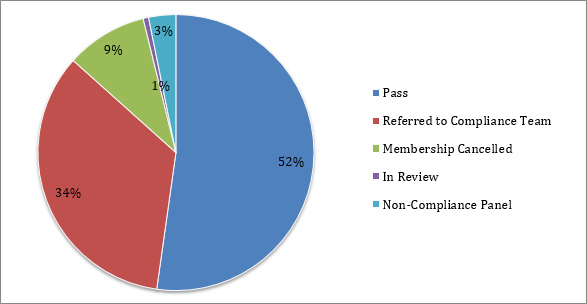
As part of the Monitoring Strategy, RECC collects certain performance measures in line with the key Compliance Areas. The charts below show these statistics.
Fig 6.5 Performance measures in regards to Code promotion.

Figure 6.6 below shows the principal areas of non-compliance in the 2015 audit round. These are shown against the key Compliance Areas (CAs) . The most frequent area of non-compliance is pre-contractual information (CA4). This is of concern as important information should always be made available before contract agreement and the critical nature of this is recognised in law in the Consumer Contracts (Information, Cancellation and Additional Charges) Regulations 2013 (the CCRs) and in the Consumer Rights Act 2015. In addition to the model documents available to members free of charge, RECC has also conducted a series of training webinars on this area. There is also in-depth detailed guidance on the presentation of this information.
Contracts and cancellation rights (CA6) was another area of frequent non-compliance. The Consumer Rights Act 2015 represented an important change in consumer protection legislation in the UK, implementing important new consumer rights. This legislation also has important implications for marketing and selling (CA3); frequently an area of non-compliance at audit. RECC provided guidance and several webinars on the changes to assist members to comply with the new legislation (see page 13 for more details on this).
Fig 6.6 Areas of non-compliance in audit visits by key Compliance Area
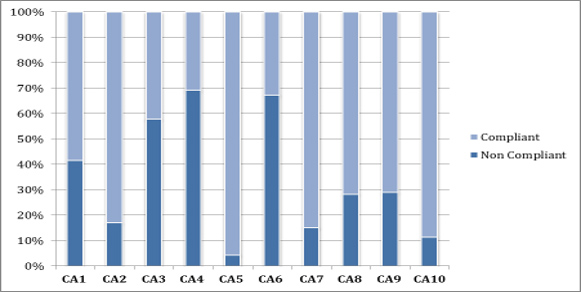
At an individual member level, monitoring enables RECC to pinpoint areas where a member needs to improve and to assist them to achieve compliance. It also enables RECC to identify instances where disciplinary action may be required. Following the audit site visit the member receives a copy of the completed audit questionnaire and a follow-up letter setting out any areas of non-compliance where it is required to take remdedial action. The member must submit documentation and evidence to show that it has addressed these areas. The Compliance Team will review any issues that remain outstanding after the final deadline.
During 2015 15 independent auditors carried out compliance audits on behalf of RECC:
Independent auditors
| Virginia Barstow | Yvonne McGivern |
| Hamish Bell | Colin Meek |
| Sue Bloomfield | Carole Pitkeathley |
| Clare Carden | Jackie Robinson |
| Fiona Flynn | Geoff Stow |
| Steve Gillon | Fiona Tittensor |
| Louise David | Paul Voysey |
| Yousouf Jhugroo |
6.2.2 Results for desk-based compliance audits
Members assessed as medium and lower risk can be required to take part in a desk-based audit, carried out either by an external independent auditor or by RECC staff. In 2015 RECC conducted desk-based audits on 446 members. If an auditor considers it necessary, a site visit may be carried out in addition to the desk-based audit.
Members selected for desk-based audit are invited to:
- complete a questionnaire;
- submit evidence for review;
- have checks run on credit and trading history, website claims, history of disputes, checks on deposit and workmanship warranty insurance provision etc; and in some cases
- take part in a telephone-based, semi-structured interview.
6.3 Mystery shopping
RECC conducts targeted mystery shopping exercises with a view to checking the level of compliance of members considered to pose a high risk of consumer detriment. RECC has a team of mystery shoppers spread throughout the country who assist us by carrying out such mystery shopping exercises.
RECC members are selected for mystery shopping on the recommendation of auditors, as a result of disputes or other intelligence received, or because members have exhibited a high risk of non-compliance in some other way. The principal focus of this exercise is to monitor selling techniques and pre-contractual information provided by members.
Mystery shoppers complete RECC’s bespoke evaluation forms sat all stages of their contact with the member. RECC reviews the results and then decides what follow-up action is appropriate.
Where the msytery shopper identifies non-compliant behaviours, RECC notifies the member and requires them to address the issues. Where it is evident that the member is unwilling to co-operate by taking remedial action, RECC refers the member to the Compliance Team.
6.4 Surveying consumer satisfaction
RECC monitors how satisfied consumers are with the service they have received and also checks that member are complying with the Code. Consumers may log feedback online using the ‘Rate your installer’ tool on the RECC website. Alternatively, consumers may return hard copy Customer Satisfaction Survey (CSS) questionnaires directly to us. For example, all consumers whose installations are registered under the DAWWI insurance scheme receive a CSS questionnaire with their policy documentation. In this way consumers are able to provide feedback on the experience they have had with members. We analyse all feedback posted online provided in returned questionnaires.
The charts overleaf show that the majority of consumers who provided feedback were positive about their experience with RECC members:
- 94% of consumers said they were provided with sufficient information about the system before signing a contract;
- 96% said that the performance of the system was clearly explained to them as well as what this meant in financial terms;
- 91% said they were made aware of their cancellation rights.
Of those consumers who did not give such positive feedback:
- 28% said they were not made aware of a dispute resolution procedure;
- 19% said they were not made aware of the Consumer Code before they signed the contract.
Fig 6.7 Consumer satisfaction questionnaire responses by question 2015
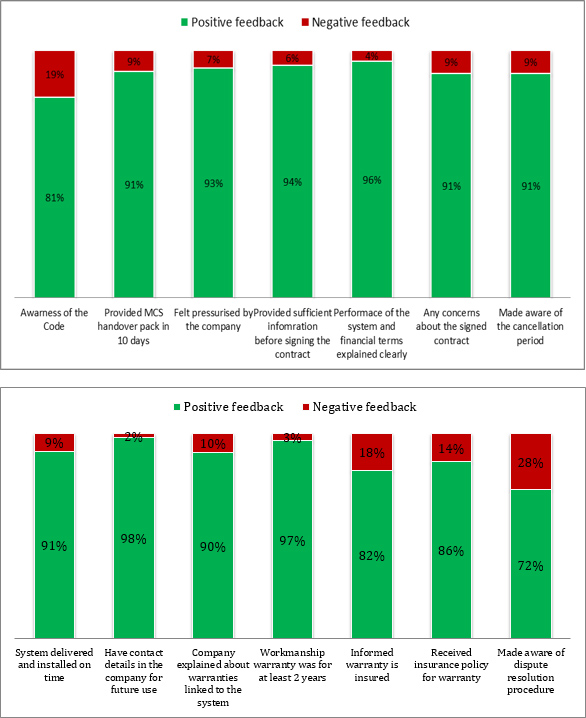
Feedback received from hard copy questionnaires about the way the system had been installed and about the way in which the system was sold to them overall show that:
The way the system was installed:
- 80% of consumers rated it as 10/10 or 9/10 indicating they were very satisfied or satisfied;
- 21% of consumers rated it as below 8/10.
The way the system was sold:
- 81% of consumers rated it as 10/10 or 9/10 indicating they were very satisfied or satisfied;
- 18% of consumers rated it as below 8/10.
Fig 6.8 Satisfaction rates with system installation and company selling methods
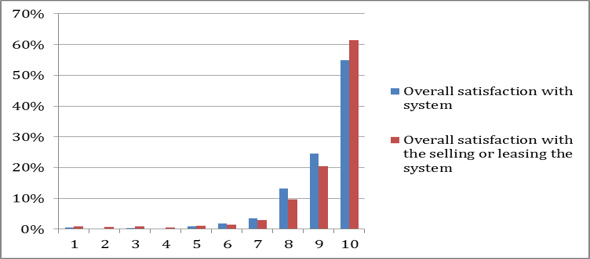
The feedback RECC received in 2015, both online and through hard copy questionnaires, gave us an insight into RECC members’ business models. Of the consumers who provided feedback:
- 47% said they had signed a contract during the sales visit;
- 8% said they had bought their system with finance, of which 69% said they had been given adequate information and documentation regarding the finance agreement;
- 82% said they had paid a deposit as part of the contract, of which 79% confirmed that they had received an insurance policy which protected their deposit.
7. Enforcing compliance with the Code
In 2015 RECC’s Compliance Team continued to investigate suspected breaches of the Code and/or the Bye-Laws. RECC may investigate evidence of a potential breach from a wide range of sources of information including:
- disputes and feedback;
- an analysis of arbitration outcomes;
- audit site visit reports;
- compliance checks and spot checks;
- the results of Consumer Satisfaction Surveys;
- mystery shopping reports;
- intelligence from Citizens Advice, Trading Standards Departments, the Advertising Standards Authority, Courts or tribunals, Financial Conduct Authority, Companies Investigation Branch, Scam Busters;
- publicly available information including media reports; and/or
- the MCS Administrator or MCS Certification Bodies.
The Compliance Team compiles evidence from a range of these sources. Where there is evidence of breach, the Team sends it to the member who is invited to respond providing the necessary clarification and explanation. This is the start of the disciplinary procedure. In line with this 2015 the Compliance Team wrote to 48 members inviting them to respond to evidence of potential breaches.
7.1 Invoking non-compliance action
Where the member is unable to provide the evidence required to demonstrate full compliance or where the initial evidence suggests a serious breach of the Code, RECC may formally invoke Non-Compliance Action. In line with the Bye-Laws RECC may impose a number of sanctions on the member once the disciplinary process has commenced, including inviting the member to sign a Consent Order agreeing not to breach the Code or Bye-Laws again or imposing a period of enhanced monitoring. In line with this, in 2015 RECC invoked non-compliance action against 28 members, 4 of whom agreed Consent Orders with RECC. You can find full details of the Consent Orders here: www.recc.org.uk/scheme/disciplinary-procedure/consent-orders .
7.2 Convening the independent Non-Compliance Panel
If further evidence of potential breaches is received, or if a member breaches a Consent Order, RECC may convene an independent Non-Compliance Panel (NCP) Hearing to consider the matter. In 2015 the NCP held 4 independent Hearings. The outcomes are summarised in Figure 7.1, below. You can find full details of the Determinations here: www.recc.org.uk/scheme/non-compliance-panel/hearings .
The governance of the NCP is set out in full in the RECC Bye-Laws and in the NCP Rules. All NCP members are independent of the RECC Executive and a majority, including the Chairman, is independent of the sector. The Chairman of the NCP is Mary Symes. She has held this post since August 2012. In 2015 there was a pool of six other NCP members from which each Panel is drawn. In 2015 they were: Amanda McIntyre, Sally Oakley, Elizabeth Stallibrass, Jim Thornycroft, Helen White and Alan Wilson.
Figure 7.1 Summary of independent Non-Compliance Panel activity in 2015
Non Compliance Panel
| Number of independent NCP Hearings held | 4 |
| Number of members invited to attend Hearings | 4 |
NCP Determinations:
| 2 1 1 |
| No of members attending NCP Hearing for second time | 1 |
NCP cost awards
| Number of NCP Hearings in which NCP awarded costs to RECC | 4 |
| Number of NCP Hearings in which NCP awarded costs to Member | 0 |
| Amount of costs NCP awarded to RECC | £57,484 £3,285 £3,595 £3,285 |
| Average costs of each NCP Hearing | £3,285 |
7.3 Convening the independent Appeals Panel
The independent Appeals Panel is ad hoc and is comprised of members of the pools of the other two panels. A member serving on the Appeals Panel may not previously have considered the appellant member in any other forum. The governance of the Appeals Panel is set out in full in the RECC Bye-Laws and in the Rules. In 2015 two members appealed against an NCP Determination although only one appeal was heard in 2015. In this case an Appeals Panel Hearing was convened.
Keith Richards was the Chairman of the Appeals Panel, and the Appeals Panel upheld the NCP Determination. This is summarised in Figure 7.2, below. You can find full details of the Appeals Panel Determinations here: www.recc.org.uk/scheme/appeals-panel/determinations .
Fig 7.2 Summary of independent Appeals Panel activity in 2015
Appeals Panel
| NCP Determinations referred to independent Appeals Panel | 2 |
| Number of Appeals Panel Hearings held | 1 |
Of which the Appeals Panel:
| 1 |
8. Resolving consumer disputes with members
In 2015 RECC registered 1,485 disputes in total. Of these 31% were for RECC to handle while 31% were feedback disputes in which consumers were not seeking redress but simply wanted to register their dissatisfaction. Disputes about non-members are also recorded as feedback and accounted for 4% of the total feedback disputes. In these cases RECC advises the consumer to contact Citizen’s Advice. Where the non-member has sub-contracted work to a member, RECC will seek to resolve the complaint through the member.
8.1 Categorising consumer disputes
The disputes RECC registered in 2015 were in respect of 549 different RECC members/ex-members. 412 of these members had just one dispute registered against them; the remainder had more than one with 6 having 20 or more disputes registered against them. In some cases RECC is not the appropriate body to handle the dispute registered. For example, disputes predominantly or partly about technical issues made up 22% of all disputes registered in 2015. These disputes were passed to the member’s MCS Certification Body whose responsibility it is to investigate technical disputes and to enforce compliance with MCS installer standards. (Some of them may have been passed back to RECC if there were are any outstanding issues relating to the Code after any technical issues have been resolved.)
It is important to note that these figures do not reflect the total consumer detriment in the sector since they exclude those reported to other bodies and those that went unreported.
Fig 8.1 Total number of disputes registered with RECC by year
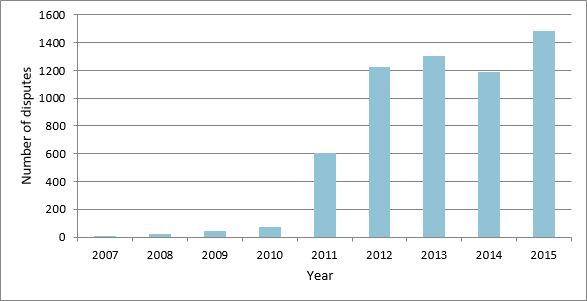
Fig 8.2 Total number of disputes registered with RECC by month in 2015
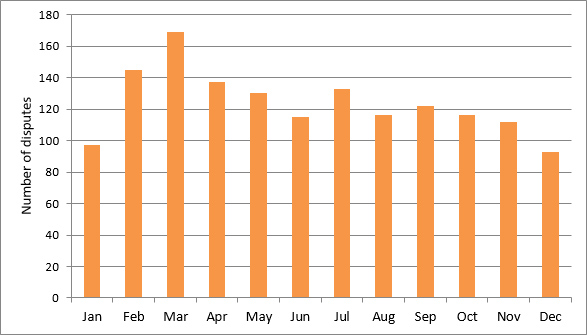
Fig 8.3 Disputes registered by RECC in 2015 by category
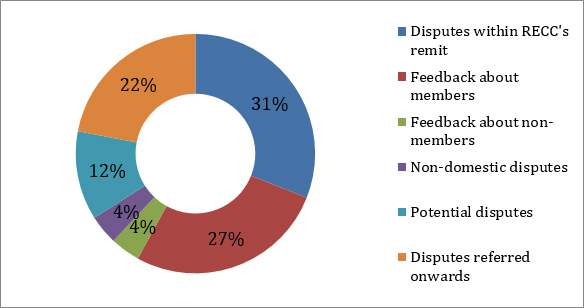
Fig 8.4 Disputes registered by RECC in 2015 by technology
Please note that any complaints regarding multiple technologies have been counted once for each technology, for the purposes of this graph.
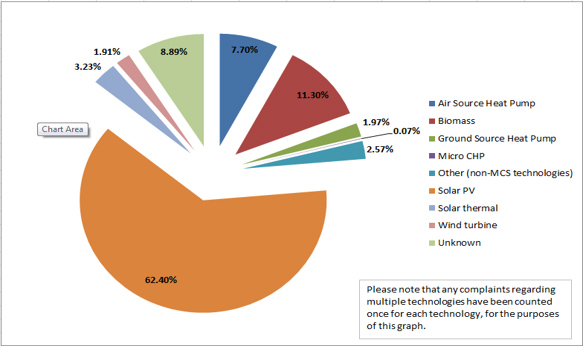
Fig 8.5 Disputes registered by RECC in 2015 by technology
Technology |
Disputes registered by RECC in 2015 |
Disputes registered by RECC in 2014 |
Variance 2015 over 2014 (%) |
Air source heat pump |
117 |
119 |
-2 |
Biomass |
171 |
68 |
+ 151 |
Ground source heat pump |
30 |
18 |
+ 67 |
Micro CHP |
1 |
1 |
0 |
Other (non-MCS) |
39 |
34 |
+ 15 |
Solar PV |
948 |
778 |
+ 22 |
Solar thermal |
49 |
56 |
-13 |
Unknown |
135 |
130 |
+ 4 |
Wind turbine |
29 |
22 |
+ 32 |
Fig 8.6 Disputes registered with RECC by technology (% of all domestic installations)
Technology |
Percentage |
Disputes registered with RECC |
Total domestic installations |
ASHP |
2.7 |
108 |
4,025 |
Biomass |
3.9 |
160 |
4,150 |
GSHP |
3.1 |
28 |
894 |
Solar PV |
0.7 |
948 |
142,250 |
Solar thermal |
4.8 |
48 |
997 |
Fig 8.7 Solar PV disputes registered with RECC by year(% of all domestic installations)
Year |
Percentage |
Solar PV disputes registered with RECC |
Total domestic solar PV installations |
Total domestic solar PV installed capacity |
2015 |
0.7 |
948 |
142,250 |
517 MW |
2014 |
0.7 |
754 |
110,120 |
406 MW |
2013 |
1.1 |
937 |
85,755 |
313 MW |
2012 |
0.5 |
1,051 |
201,178 |
687 MW |
2011 |
0.4 |
439 |
124,385 |
381 MW |
Fig 8.8 Solar PV disputes registered with RECC by year (% of all domestic solar PV installations)
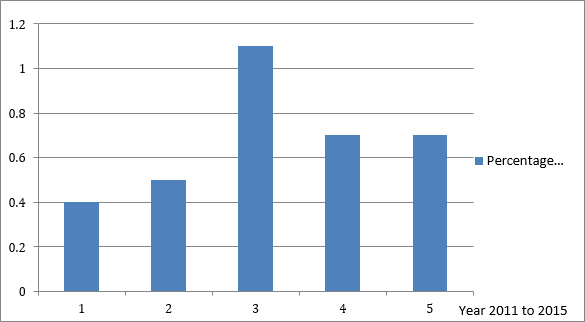
Fig 8.9 Issues underlying disputes registered by RECC in 2015 by Key Compliance Area
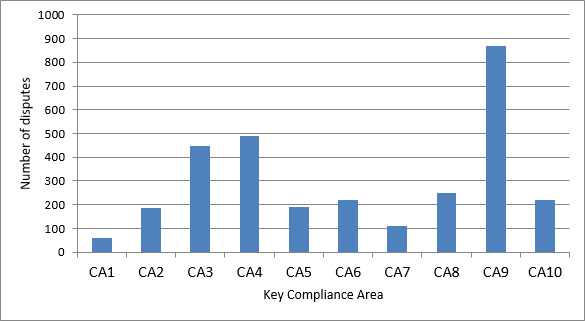
8.2 Resolving consumer disputes by means
RECC’s team of 10 experienced dispute resolution case workers work very hard to resolve disputes that fall within RECC’s remit. In 2015 our dispute resolution case workers were able to resolve by means of mediation 54% of the disputes allocated to them. (See Figure 8.10, below.)
Of the 224 disputes which were resolved in 2015 it took on average 27 weeks to resolve each one (60% of disputes took less than 27 weeks to resolve, while 40% disputes took more than 27 weeks). Those where another organisation was involved (such as an MCS Certification Body), in addition to RECC, took on average 38 weeks to resolve.
Fig 8.10 Breakdown of means by which disputes were resolved in 2015
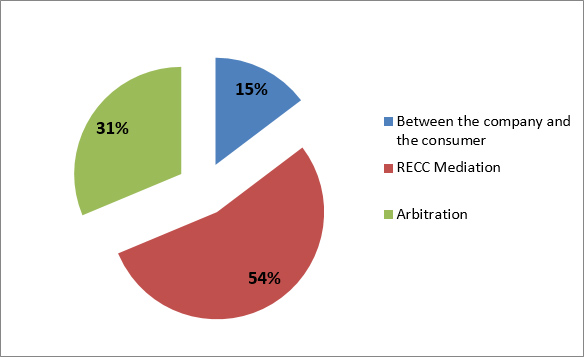
Fig 8.11 Length of time taken to resolve disputes in 2015
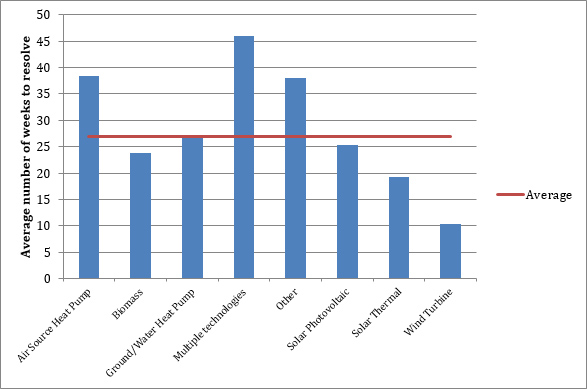
Fig 8.12 Key Compliance Areas for disputes
CA1: Awareness of consumer protection / RECC (including staff training)
- Training of staff
- Training of/including RECC in dealings with sub-contractors
- Senior management awareness
- Failure to foster consumer awareness – provision of leaflet, link to Code from member’s website, display of RECC logo
CA2: Microgeneration Certification Scheme (MCS)
- Contracting party is not MCS-certified for technologies they sell/install
- Contracting party is not also the party applying for MCS certificate
- Compliance with MCS standards (regarding documentation such as performance estimates and handover packs, as well as workmanship/technical issues)
- Sub-contracting is not in line with MCS (including having a contract with sub-contractors)
CA3: Marketing and selling
- Misleading advertising and marketing
- Cold-calling/Telephone Preference Service-registered customers
- Sales visits/discounting
- Visits to vulnerable consumers
- Payments for referrals/advertising boards/testimonials
CA4: Estimates/quotes, particularly performance estimates and financial incentive
- Incorrect performance estimates
- Information on Permissions/EPC, responsibility for etc
- Income/savings estimates
- FiTs/RHI information
- Quotes
- Information for vulnerable consumers
- Survey
- Design
CA5: Finance agreements
- Consumer information
- Terms, including cooling off period for finance agreement
- Transparency of member benefits from link with the finance provider, where these are discoverable
CA6: Contracts and cancellation rights
- Fair terms and conditions
- Cancellation period
- Cancellation rights
- Contract change procedures (including recalculation of performance estimate or expected income figures &c)
- Refund of deposit:
- when cancelled inside cancellation period
- when cancelled outside cancellation period
- when post-contract survey shows, or installer finds, problems with contracted system
- Title
- Contractual discrepancies:
- design differs
- failure to provide items (eg monitors) in contract
CA7: Taking and protection of deposits and advanced payments
- Percentage of contract price taken as deposit
- Percentage of contract price taken as advanced payment
- Timing of the taking of advanced payments
- Deposit protection
- Client account (subject to change)
CA8: Completing the installation
- % of consumers completing CSS questionnaires satisfied with the system they have installed
- number and % of disputes registered that relate to completing the installation
CA9: After –sales (guarantees, workmanship warranties and warranty protection, after sales support: customer service)
- Storing goods
- Delivery dates in writing
- Timeliness of installation
- Testing, commissioning and handover
- Company insurance against damage during install
CA10: Disputes numbers, handling, procedures
- Manufacturers guarantees
- Workmanship warranty provision
- Workmanship warranty length
- Warranty protection
- Extended warranties
- Servicing agreements
- After-sales support: customer service, call backs, replies to emails etc.
- Repairs
8.3 Referring consumer disputes to the independent arbitration service
8.3.1 Domestic claims
Where a dispute remains unresolved following RECC’s mediation process a consumer may apply to the independent arbitration service. The service is provided for RECC by IDRS Ltd, part of the Centre for Effective Dispute Resolution (CEDR). If a consumer asks for access to the arbitration service the member must agree.
Consumers and members are each required to contribute £100 + VAT to the cost of the service, with RECC contributing the balance. The arbitrator’s award is binding and enforceable, and is an alternative to a court judgment. The arbitration service rules can be found here: www.recc.org.uk/pdf/arbitration-service.pdf.
The total amount awarded to domestic consumers at arbitration in 2015 was £391,963, with the average amount awarded £6,124.
Fig 8.13 Summary of the 71 domestic arbitration awards made in 2015
Outcome |
Number |
Percentage |
Claim dismissed |
6 |
8 |
Claim succeeded in part |
40 |
56 |
Claim succeeded in whole |
25 |
35 |
Total |
71 |
|
Member ordered to refund the consumer's £120 registration fee |
61 |
86 |
Consumer ordered to refund the member's £120 registration fee |
4 |
6 |
No costs order made |
6 |
8 |
Total |
71 |
|
Financial award made |
32 |
45 |
Non-financial award made, e.g. provision of documentation, removal of a system or rectification of damage ordered |
1 |
1 |
Both financial and non-financial award made |
32 |
45 |
No award made |
6 |
8 |
Total |
71 |
8.3.2 Micro-business claims
The independent micro-business arbitration scheme is designed for those consumers who do not fall within the definition of domestic consumer but who are close to domestic. For example they could be small farmers, or they could run a small hotel or offer bed and breakfast accommodation. Such consumers do not have access to RECC’s formal consumer dispute resolution procedure, but may proceed directly to the micro-business arbitration service. The rules can be found here: www.recc.org.uk/pdf/arbitration-scheme-for-commercial-disputes.pdf.
Fig 8.14 Summary of the 5 micro-business arbitration awards made in 2015
Outcome |
Number |
Percentage |
Claim succeeded in part |
3 |
60 |
Claim succeeded in whole |
2 |
40 |
Total |
5 |
|
Member ordered to refund the consumer's £200 registration fee |
5 |
100 |
Consumer ordered to refund the member's £200 registration fee |
0 |
0 |
No costs order made |
0 |
0 |
Total |
5 |
|
Financial award made to micro business |
4 |
80 |
Financial award made to member |
1 |
20 |
Non-financial award made |
0 |
0 |
No award made |
0 |
0 |
Total |
5 |
9. Resourcing the RECC team
9.1 RECC team
The RECC team works tirelessly to promote and enforce the Code in a robust and even-handed way. With backgrounds in economics, law, trading standards, dispute resolution, customer service, renewable technologies and environmental management, between us, we have a wealth of knowledge and experience available to consumers and members alike. We are always happy to answer questions and provide advice on a range of different subjects. What makes the team really special is our committment to our members and our consumers.
Operations
Virginia Graham – Chief Executive
Mark Cutler – Head of Operations
Membership
Aida Razgunaite – Membership Manager
Andreea Miu – Membership Assistant, half-time (up to 31 August 2015)
Georgia Phetmanh – Membership Assistant (from 16 November 2015)
Monitoring
Sam Bourn – Monitoring Manager
Andreea Miu – Monitoring Assistant, half-time (up to 31 August 2015)
Compliance
Rebecca Robbins – Compliance Manager
Andreea Miu – Compliance Analyst (from 1 September 2015)
Independent Panels
Sian Morrissey - Head of Panels Liaison (up to 31 August 2015)
Lorraine Haskell – Panels Liason Manager (from 1 September 2015)
Lorraine Haskell – Panels Assistant (up to 31 August 2015)
Dispute resolution
Sarah Rubinson – Dispute Resolution Manager
Abena Simpey – Dispute Resolution Case Worker
Sumandeep Sohi – Dispute Resolution Case Worker
Stacey-Ann Willoughby – Dispute Resolution Case Worker (up to 18 January 2015)
Angie Elwin – Dispute Resolution Case Worker (from 19 January to 11 September 2015)
Emily Lynskey – Dispute Resolution Case Worker (from 21 October 2015)
Dispute resolution – working externally
Eileen Brennan – Dispute Resolution Case Worker
Jonathan Bullock – Dispute Resolution Case Worker (from 27 April 2015)
Anna Hills – Dispute Resolution Case Worker
Annabel Howcroft – Dispute Resolution Case Worker
Caroline Sharpe – Dispute Resolution Case Worker (from 2 May 2015)
Camilla Thomas – Dispute Resolution Case Worker (from 27 April 2015)
Victoria Thorp – Dispute Resolution Case Worker

9.2 RECC budget
In 2015 a high proportion of RECC's expenditure was spent on monitoring, commpliance and dispute resolutin activities which accounted for over third of total expenditure.
Fig 9.1 Breakdown of RECC's expenditure in 2015
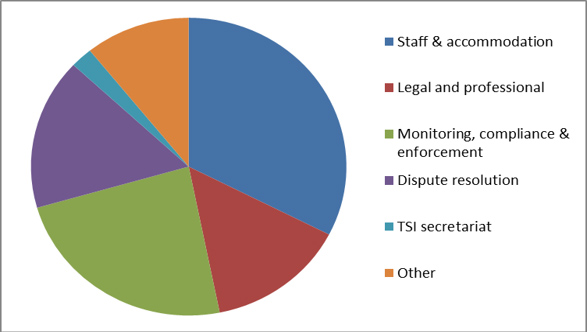
10. Looking ahead
RECC moved into 2016 in the face of major changes to the Feed-In Tariff scheme due to come into force early in January and changes to the Renewable Heat Incentive signalled for later in the year. The future of financial incentives for small-scale renewable generators is now in question. We understand that this is a time of enormous uncertainty for our members as they struggle to understand what the new landscape will mean for them.
Coupled with these changes there are ongoing technical developments which mean that the typical offering to consumers is in any case changing. In particular, a number of our members are now offering battery storage either with new solar PV systems or as a retro-fit for existing systems. Others are looking at voltage optimisers, immersion boost systems and LED lighting.
At the same time our members are having to come to terms with important changes in the domestic consumer protection legislation landscape: 2014 saw the Consumer Contracts (Information, Cancellation and Additional Charges) Regulations 2013 implemented, while October 2015 saw the Alternative Disputes Resolution Regulations 2015 and the Consumer Rights Act 2015 implemented.
The RECC team is working very hard to assist our members come to terms with all these far-reaching changes. We have provided extensive, up-to-date and accurate guidance and training, one-to-one advice and a number of reliable sources for leads. At the same time we continue to make the case to Government for the importance of the domestic sector and the need to ensure that the interests of domestic consumers are safeguarded.
Finally, during the year RECC worked hard to ensure that the serious challenges for consumer protection presented by having more than one approved Code in the sector are minimised. We remain extremely vigilant with a view to preventing increased consumer confusion and detriment. To this end we complied fully with a sector Memorandum of Understanding agreed with CTSI. We also agreed a joint protocol as the basis all approved Codes have access to the independent Panels set up by RECC,
29 April 2016.